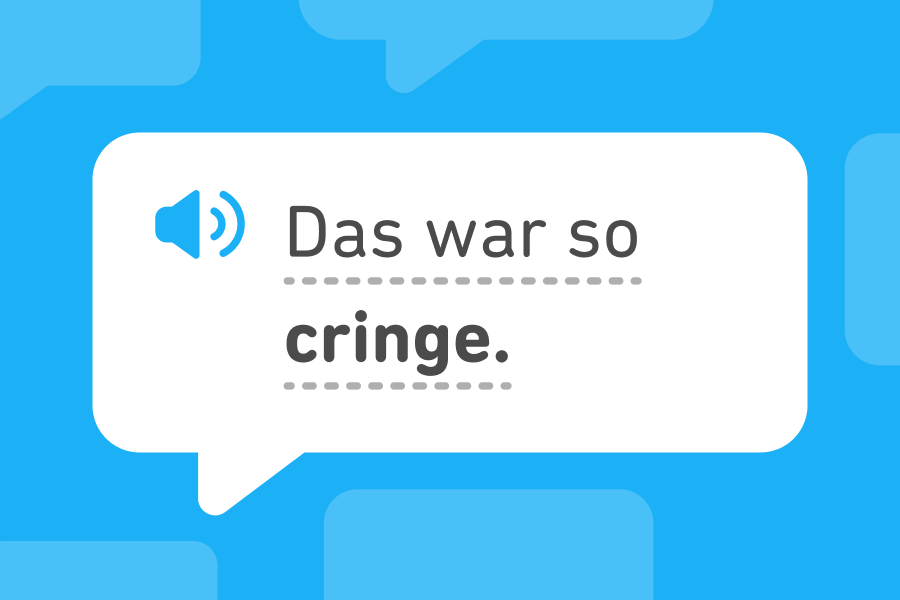Is English ruining the German language? 👀
You may have noticed many English-seeming words in your German lessons, and these expressions are sometimes called Denglish. This term can be used to describe many things, one of which is the usage of English words and grammar in German sentences.
Given that so many German speakers are proficient in English, this type of language change is no surprise! Language mixing, like the Spanish and English used in Spanglish, is a totally normal process found among bilinguals.
In einem Meeting
Translation: In a meeting
The most common time to hear words from English in German is the workplace. Das Meeting is a great place to start! Here’s how to use this English borrowing in a sentence:
In einem Meeting mit dem Marketing-Team hat das Screensharing nicht funktioniert.
In a meeting with the marketing team, the screen sharing was not working.
This is sort of an extreme example—you wouldn’t necessarily see all of these words in one sentence—but they’re definitely being used individually in German-speaking offices right this second!
Another common place to find English is in job titles. Having a CEO, Key-Account-Manager, or Consultant—English titles you’ll find in German-speaking companies—is often seen as more modern than their German counterparts: Geschäftsführer, Großkundenbetreuer, and Berater.
Coole Wörter
Translation: Cool words
When you leave the office, you might meet up with your friends and say:
Ich bin kein großer Fan von Partys. Mein Hobby ist Surfen. Das finde ich cool.
I’m not a big fan of parties. My hobby is surfing. I think it’s cool.
For many of these words, it would not even be obvious to many speakers that they come directly from English. They feel German now!
Von Teenagern
Translation: from teenagers
There are many brand new English words that you’ll find in German, too! The people who first adopt a new word from another language are often teenagers and young people in general, so you may hear a German-speaking teenager say:
Das war so cringe! Ich war einfach lost, bis ich diese Lösung gefunden habe. Was für ein Gamechanger!
That was so cringe. I was so lost (confused) until I found this solution. What a game changer!
Many of these sorts of goofy borrowings make the Jugendwort des Jahres—the youth word of the year. In fact, goofy was the winner in 2023!
What about grammar?
Language contact can lead to changes in grammar as well.
For example, the typical way to say “that makes sense” in German is Das ergibt Sinn—literally, “that yields sense.” But the word-for-word translation from English, Das macht Sinn, is becoming more common. When you think about it, das macht Sinn, doesn’t it? 😛
Another phrase that is directly translated from English is am Ende des Tages (at the end of the day), which is a perfectly fine phrase in German—but it is beginning to take on a life of its own. Although it started with only the literal meaning of something that occurs at the end of the day, it’s now used primarily in German with the same idiomatic meaning that we use in English, for summarizing something!
Phrases aren’t the only kinds of grammar subject to change. If you want to welcome someone in German, you would say Willkommen bei Duolingo (Welcome to Duolingo) or Willkommen in Berlin (Welcome to Berlin). But these days, there’s another preposition in the mix: zu, a translation for the English “to.” One day, we might start saying Willkommen zu Duolingo.
There’s another preposition situation that could be slowly changing before our very eyes! In German, you say im Jahr 2024 (in the year 2024) or just 2024 for situations in which you would use in 2024 in English. In increasingly more newspaper articles, you can see sentences with the English preposition instead—for example Ich habe in 2024 meinen Abschluss gemacht (I graduated in 2024.).
So is it still worth learning German?
Yes! Languages are always changing, and these English borrowings are getting shaped into German words in their own right. For example, many English words have taken on new meanings in German, like Handy for “cellphone” and Box for a (bluetooth) speaker!
Just like English adopted—and adapted—Hamburger (person from Hamburg) and kindergarten (preschool) from German, German speakers are innovating with English vocabulary and grammar in their own language. There are many exciting changes ahead for the German language!
